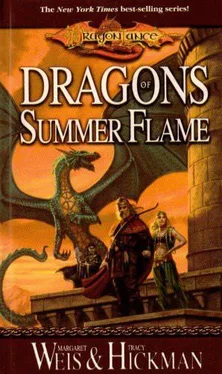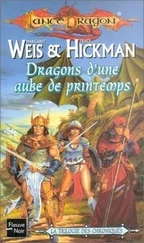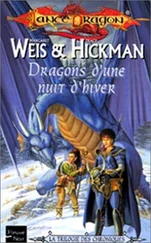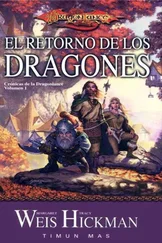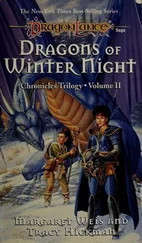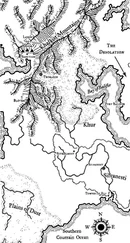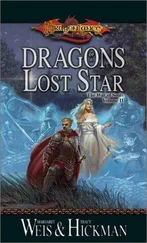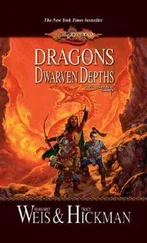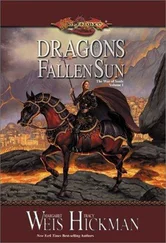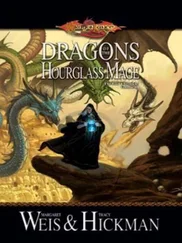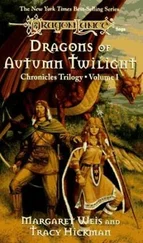Margaret Weis - Dragons of Summer Flame
Здесь есть возможность читать онлайн «Margaret Weis - Dragons of Summer Flame» весь текст электронной книги совершенно бесплатно (целиком полную версию без сокращений). В некоторых случаях можно слушать аудио, скачать через торрент в формате fb2 и присутствует краткое содержание. Жанр: Фэнтези, на английском языке. Описание произведения, (предисловие) а так же отзывы посетителей доступны на портале библиотеки ЛибКат.
- Название:Dragons of Summer Flame
- Автор:
- Жанр:
- Год:неизвестен
- ISBN:нет данных
- Рейтинг книги:4 / 5. Голосов: 1
-
Избранное:Добавить в избранное
- Отзывы:
-
Ваша оценка:
- 80
- 1
- 2
- 3
- 4
- 5
Dragons of Summer Flame: краткое содержание, описание и аннотация
Предлагаем к чтению аннотацию, описание, краткое содержание или предисловие (зависит от того, что написал сам автор книги «Dragons of Summer Flame»). Если вы не нашли необходимую информацию о книге — напишите в комментариях, мы постараемся отыскать её.
Dragons of Summer Flame — читать онлайн бесплатно полную книгу (весь текст) целиком
Ниже представлен текст книги, разбитый по страницам. Система сохранения места последней прочитанной страницы, позволяет с удобством читать онлайн бесплатно книгу «Dragons of Summer Flame», без необходимости каждый раз заново искать на чём Вы остановились. Поставьте закладку, и сможете в любой момент перейти на страницу, на которой закончили чтение.
Интервал:
Закладка:
She wanted power, wanted to rule over others. She tried but could not gain ascendance over her brothers. Paladine was too strong-willed, Gilean oblivious. And thus we Irda believe that it was at the instigation of Takhisis that the world of Krynn and all life on this plane came into being.
Takhisis can be quite charming and clever when she wants. She went to her two elder brothers with the idea of creating a world and spirits to dwell within it. To Paladine she laid stress on how these spirits would bring order to the otherwise chaotic universe. Paladine had long been troubled by the fact that their lives had no purpose, no meaning. He and his consort, Mishakal, were pleased with the idea of change, and gave their consent.
“Of course, you have spoken to Father about this,” Paladine said. “You have obtained his permission.”
“Oh, of course, my dear brother,” Takhisis replied.
Paladine must have known that his sister lied, but he was so eager to order the universe that he closed his eyes to the truth.
Takhisis then went to Gilean. She spoke to him of the opportunities for study, a chance to see how beings other than themselves would react in various situations.
Gilean found this notion intriguing. Having no consort (we have no record on what happened to her), Gilean consulted with Zivilyn, a god who came from one of the other immortal planes, simply referred to as Beyond. Zivilyn is said to exist in all planes at all times.
Zivilyn looked ahead and he looked behind. He looked to his left and to his right. He looked up and he looked down and finally pronounced the idea a good one.
Gilean, therefore, agreed.
“You have, of course, mentioned this matter to Father,” Gilean asked, as an afterthought, not even bothering to look up from his book.
“Certainly, my dear brother,” Takhisis returned.
Gilean knew that Takhisis lied—Zivilyn had warned him she would. But the opportunity for knowledge was too great a temptation, so Gilean closed his eyes to the truth.
Having obtained agreement from her brothers, Takhisis put her plan into action.
There lived, in Beyond, a god known as Reorx.
Nothing much is known about his past, although there are rumors that some terrible tragedy occurred, which led him to shun the company of other immortals. He dwelt alone on his plane, at his forge, spending his time creating things beautiful and horrific, wondrous and terrible. His delight was in the creation. He had no use for any of the objects he made and, once they were finished, he simply tossed them away. We see them still. One will occasionally fall to the ground. They are known as shooting stars.
Takhisis went to Reorx and praised his creations.
“But what a pity,” she said, “that you should throw them away! I have in mind a plan. You will create something that will not bore you, but will offer you new challenges every day of your immortal life. You will create a world and populate this world with spirits, and you will teach these spirits all the skills that you know.”
Reorx was captivated at the thought. At last, his endless creating would have some use, some benefit. He readily agreed.
“You have cleared this with the Father?” he asked Takhisis.
“I would have never come to you otherwise,” she responded.
Reorx—simple and guileless—had no idea that Takhisis was lying.
The gods gathered together: Paladine, Mishakal, and their children; Gilean and his only natural daughter, along with his adopted children; and Takhisis, her consort, Sargonnas, and their children. Reorx arrived, set up his forge, and—in the midst of the dark and endless night of Chaos—he placed a chunk of red-hot, molten metal and struck the first blow with his hammer.
At that moment, the two brothers were forced to open their eyes.
Takhisis had not consulted Chaos, Father of All and of Nothing. Well aware that he would be opposed to her plan to bring order to the universe, she had deliberately kept her plot secret from him. And there is no doubt that her brothers knew it.
Chaos could have destroyed his children and their plaything then and there, but—as parents will—he decided it would be better to teach them a lesson.
“You will indeed create order,” he thundered, “but I will see to it that order will breed discord, both among you and among those who will dwell in your world.”
Nothing could be done to alter what had taken place. Sparks from Reorx’s hammer had already become the stars. Light from the stars had given birth to living spirits. Reorx himself forged a world wherein these spirits could dwell.
And it was then that Chaos’s curse was made manifest.
Takhisis wanted the newly made spirits under her control, intending to order them about and force them to do her bidding. Paladine wanted the spirits under his control, intending to nurture them and lead them in the paths of righteousness. Gilean could see no advantage to either—in an academic sense. He wanted the spirits to remain free, to choose whatever path they would walk. Thus, the world would be much more interesting.
The siblings quarreled. Their children and gods from the other planes were drawn into the battle. The All-Saints War began.
The Father of All and of Nothing laughed, and his laughter was terrible to hear.
At length, Paladine and Gilean realized that the battle might well destroy all of creation. They allied forces against their sister and, though they could not achieve total victory, they at least forced her to come to terms. She reluctantly agreed that all three should rule the new world together, maintaining a balance between them. Thus they hoped to end the curse cast on them by their Father, Chaos.
The three gods decided that each of them would give the spirits gifts that would enable them to live and prosper in the new-formed world.
Paladine gave the spirits the need to control. Thus they would work to gain control over their surroundings and bring order to the world.
Takhisis gave the spirits ambition and desire. Not only would the spirits control the world, but they would seek constantly to make it better—and to better themselves.
Gilean gave the spirits the gift of choice. Each would have the freedom to make his or her own decisions. No one god would possess absolute power.
All these gifts were good, none of them bad—unless each is taken to extremes. The need to control, taken to extremes, leads to fear of change, suppression of new ideas, intolerance of anything different.
Ambition, taken to extremes, leads to the determination to seize power at all costs, enslavement. Desires can become obsessions, leading to greed, lust, avarice, and jealousy.
Freedom—taken to extremes—is anarchy.
The spirits achieved physical form, springing from the imaginations of the gods. From Paladine’s mind came the elves—his ideal race. They delight in controlling the physical world, shaping it to their will. They live long, change little.
Takhisis imagined a race of supremely beautiful creatures, all as ambitious and selfish as herself. These were the ogres and, as their hungers increased, their beauty was consumed. But they are immensely strong and very powerful.
We, the Irda, might be said to be creations of Takhisis, for we were the original ogres. We saw what was happening to our people, and some of us turned to Paladine, begged for his help. He enabled us to break away from the Dark Queen, but the cost was dear. We could not live in proximity to other races, lest we should succumb to temptation and fall once again. We would be an isolated, lonely people, delighting in our isolation, perpetuating our own loneliness. Even coming together to produce progeny would be difficult for us, and so our people would never be numerous. All these conditions we accepted in order to escape the fate of our brethren. And therefore the world knows nothing of us—or what they do know is false.
Читать дальшеИнтервал:
Закладка:
Похожие книги на «Dragons of Summer Flame»
Представляем Вашему вниманию похожие книги на «Dragons of Summer Flame» списком для выбора. Мы отобрали схожую по названию и смыслу литературу в надежде предоставить читателям больше вариантов отыскать новые, интересные, ещё непрочитанные произведения.
Обсуждение, отзывы о книге «Dragons of Summer Flame» и просто собственные мнения читателей. Оставьте ваши комментарии, напишите, что Вы думаете о произведении, его смысле или главных героях. Укажите что конкретно понравилось, а что нет, и почему Вы так считаете.
